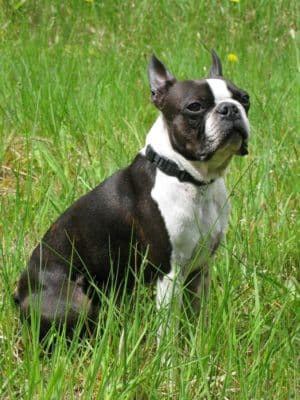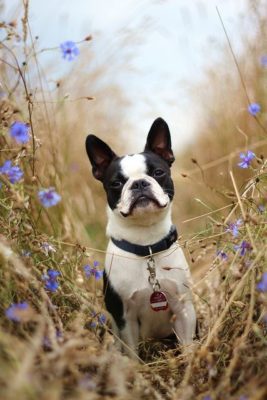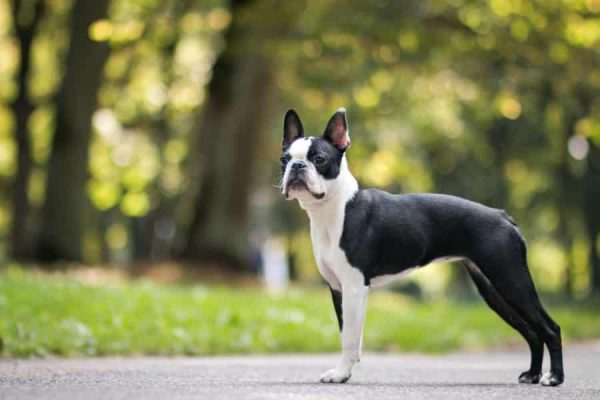Boston Terrier
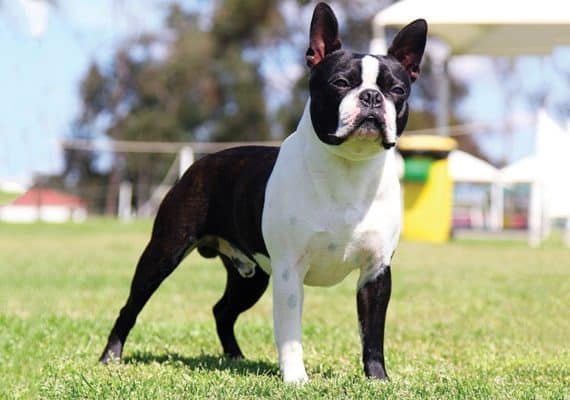
The Boston Terrier is gentle, attentive, very intelligent, well-mannered, and enthusiastic. Without the proper amount of mental and physical exercise, he can become unruly and nervous. They are very sensitive to the tone of voice. The Boston Terrier loves to learn, so it is not difficult to train him. It is an intelligent breed. If you do not make your leadership known, your dog may think he is running the show.
Table of Contents
Breed Information
| Another Name | Boston Bull, Boston Bull Terrier, Boxwood, American Gentleman |
| Origin | United States |
| Height | 30-45 cm |
| Weight | 6.8-11.4 kg |
| Fur | Short |
| Color | Black and white, tiger with white |
| Lifespan | 11-15 years |
| FCI Classification | Companion and Toy Dogs |
| Group | Decorative dogs, dogs for the apartment, dogs for kids |
| Price | $400-1100 |
Breed Photos
Origin History
Boston Terriers were bred in Boston in the late 1800s by crossing bulldogs and white English terriers. It is one of the few truly American breeds often referred to as the United States’ national dog.
Other names are called dogs. Some still call them Boston Bulls. They were also once called American Bull Terriers, but Bulldog and Bull Terrier owners objected, and in 1891 the official name – Boston Terrier – was introduced. The American Kennel Club adopted the breed in 1893. This breed has long been considered a lovable and affectionate pet and is known as the “American Gentleman.”
Boston Terriers were a common breed until the 1960s, but their popularity seems to have declined since then. Recently, however, dogs have appeared in several television commercials, perhaps indicating renewed interest in the breed.
Appearance
The Boston Terrier is a compact, sturdy little dog with a broadhead. The muzzle is short but proportional to the head, and the nose is black. The body is short and square. The breed is noted for its determination and liveliness. They have large round, wide-set eyes. Their floppy ears are small, sometimes cropped. The tail is low on the torso and can be straight or sometimes curled. Boston Terriers have short, smooth coats that can be black and white, gray, white, or tiger and white. The muscular legs are wide apart. The chest is broad, and the neck is slightly curved.
Character
The Boston Terrier is gentle, attentive, very intelligent, well-mannered, and enthusiastic. Without the proper amount of mental and physical exercise, he can become unruly and nervous. They are very sensitive to the tone of voice. The Boston Terrier loves to learn, so it is not difficult to train him. It is an intelligent breed. If you do not make your leadership known, your dog may think he is running the show. It is a dog’s instinct to have a strong leader, and this little guy is no exception to the rule. Either that leader will be a human or a dog.
Some owners report that their dogs are good guard dogs and only bark when necessary, while other owners report that their female Boston Terriers do not bark at all. Terriers are good with children and the elderly and are also very friendly with strangers. The Boston Terrier is a playful, very affectionate dog who loves to be part of the family.
Care
The Boston Terrier doesn’t shed much, so they only need to be brushed once a week and bathed only when they get dirty. Their facial folds should be cleaned and dried daily. Their eyes should be cleaned regularly. Their ears and teeth also need weekly attention.
Training
Boston Terriers are prone to stubbornness, so remember that patience is key when it comes to training. The Boston Terriers are slow. Not because they’re dumb, but because they want to do things their way. Some dogs make loud barking noises when they are disturbed. They often grunt and complain when they are upset. It can make you laugh, but if you want them to stop their tantrums, it’s best to ignore it, as it rewards the behavior.
Boston Terriers tend to be interested in food, so a tasty treat they only get during training can help. Set the rules ahead of time and ensure everyone in the family agrees; otherwise, your dog will quickly discover who is letting them break the rules.
Boston Terriers are active little companion animals that get along with almost everyone, including children and other dogs. These dogs are equally at home on the couch as they are on the run, and they are usually happy and enthusiastic.
Common Diseases
This breed is prone to eye problems such as juvenile cataracts, late-onset cataracts, entropion, distichiasis, glaucoma, corneal dystrophy, corneal ulcers, cherry eye, and dry eyes. The convex eyes of the Boston Terrier are prone to injury. And these dogs can also have deafness, patellar dislocation, heart and skin tumors, including mast cell tumors. These short-haired dogs may have difficulty breathing when stressed in hot or cold weather. They may also snore or drool.
Nutrition
If you get a Boston Terrier puppy from a breeder, he should provide you with a feeding schedule. It is important to stick to the same regimen and feed your puppy the same food to avoid an upset stomach. You can change your puppy’s diet, but this should be done gradually, and it is better to discuss the changes with your veterinarian.
Older dogs are not known to be fussy or very fussy about food. The opposite is also true: Boston Terriers tend to eat just about anything they are given. However, that doesn’t mean you can feed them lower quality food. It’s best to feed a mature Boston Terrier twice a day, once in the morning and then in the evening, making sure it’s quality food that meets all their nutritional needs. It is also important to remember that treats, fatty and spicy foods are best eliminated from the diet.
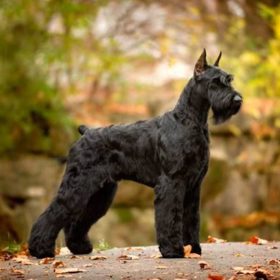 Giant Schnauzer
Giant Schnauzer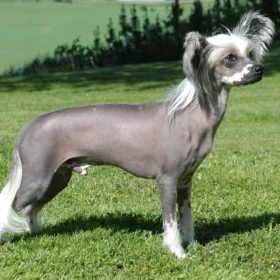 Chinese Crested Dog
Chinese Crested Dog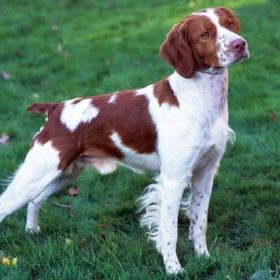 Brittany
Brittany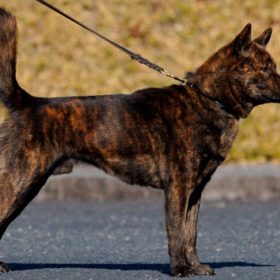 Kai Ken
Kai Ken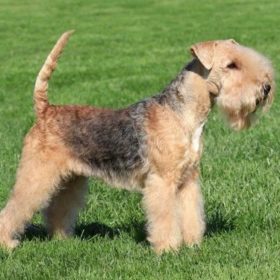 Lakeland Terrier
Lakeland Terrier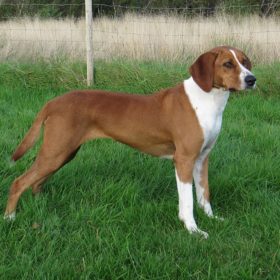 Hygen Hound
Hygen Hound